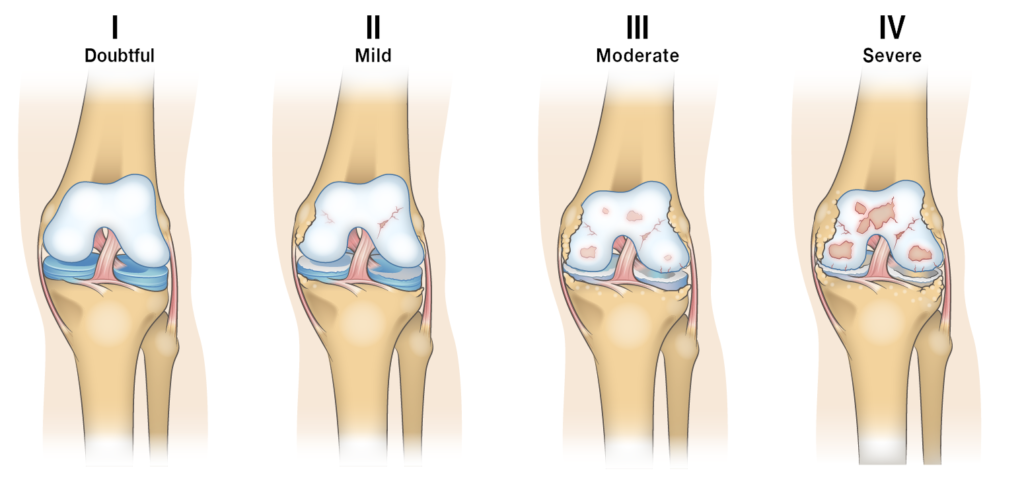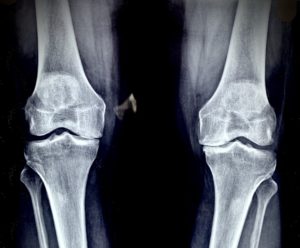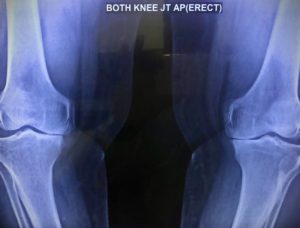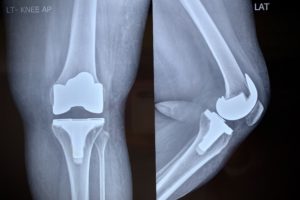Osteoarthritis of the knee joint is a progressive degenerative condition of the knee due to regular wear and tear of the internal soft structures. the cushions (cartilage) and the shock absorbers (menisci) get damaged leading to pain in the knee.

Knee Arthritis is a disorder of middle age and gradually progresses and we become old. As the cartilage wears away, one may develop abnormal bone formation called as osteophytes (bony spurs), ligament damage and damage to the meniscus causing narrowing of the knee joint space and gradual rubbing of the exposed bone.
Typically patient complains of
- Knee pain and difficulty in mobility
- Difficulty in bending the knee
- A crunching or grinding sound
- Swelling in the joints and surrounding tissue
Apart from the natural wear and tear, the factors that can lead to early arthritis are:
Injury: Post-traumatic arthritis is a common form of osteoarthritis and occurs due to a physical injury of any kind to a joint.
Obesity: Weight plays an important role in joint stress, so when people are overweight, it puts stress on their joints, especially their weight-bearing joints, like the knees and the hips.
Genetics: People who have family history of knee arthritis are at an increased risk for developing the condition
Alignment: Improper alignment of the knee can lead to unequal weight distribution and cause early progression of arthritis.


There are various treatments available for the treatment of arthritis. The treatment formulated is multifactoral and need based / tailor-made for each patient. some of the options available are :
Joint Debridement and High Tibial Osteotomy:
Joint Debridement is a procedure which involves thorough internal examination of the joint and removal of damage causing elements. In early days, it was done as open surgery, but with the advent of arthroscopy, the need for large incisions is eliminated. It involves cleaning of the loose bodies, trimming of the damaged meniscus, and treatment of cartilage damage by micro-fractures.
High Tibial Osteotomy is a procedure to change the alignment of the knee. Correction of alignment leads to reduction in further damage of knee joint and replacement surgeries can be deferred.
Arthroscopic Meniscus Root Repair:
Medial meniscal root injury is known to cause an increase in tibiofemoral contact pressure and results in early osteoarthritis. This is a very common problem of the knee joint often ignored due to lack of knowledge and due to the fact that the x-ray may look normal immediately after the injury. When there is a tear in the root of meniscus, the complete meniscus fails and there is direct loading from thigh bone to calf bone without any absorption of forces. This leads to tremendous pain and rapid degeneration of the knee. Early intervention is beneficial and is of prime importance to maintain the longevity of knee. With newer techniques, the root can be fixed with arthroscopy predictably.
Partial Knee Replacement:
For years, the treatment of arthritis was considered to be total knee replacement; however the interest for preservation of intact part of joints is gaining importance. Partial knee implant designs have also progressed in recent years and are getting more predictive. This treatment comes with certain valuable benefits. Most importantly the natural ligaments are not sacrificed and hence the function of the near is nearly normal. The joint movement and bending also is like the normal knee and proprioception (sense of knee position) is preserved. Also it is a bone preserving method and hence further procedures needed after wear are much easier than patient with total knee replacement.
Total Knee Replacement:
Total knee replacement is a surgical procedure whereby the diseased knee joint is replaced with artificial material. The procedure is basically a surgical repair of a joint; it is done when the articular cartilage of the knee becomes damaged or worn and makes the knee hard to move. Instead of sliding over each other, the bones rub and crush together.
The most common reasons behind Total Knee Replacement are Osteoarthritis, Rheumatoid arthritis, Post-traumatic arthritis. Total knee replacement surgeries are recommended in the below conditions:
- When the patient is having severe knee pain or stiffness that prevents him/her from doing everyday tasks and activities, such as walking, climbing or walking down the stairs, getting up from a bed or chair etc.
- When the patient is complaining of moderate but continuous knee pain while sleeping or resting
- When the patient is experiencing chronic knee inflammation and swelling that does not improve after taking medications, physiotherapy and resting
- Knee deformity, where there is a noticeable arch on the inside or outside of the knee

